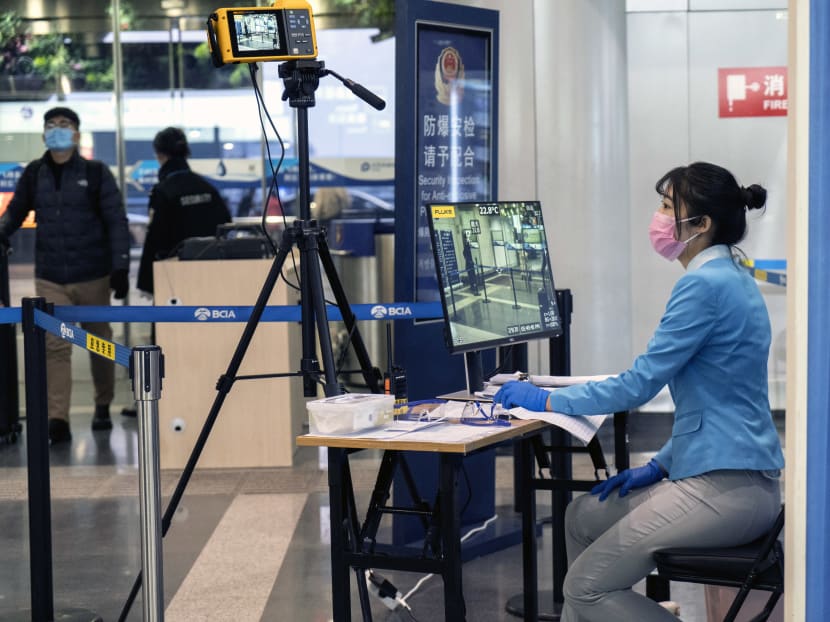Bad tech fuels false confidence in fight against Covid-19 and nearly sent me to quarantine
“Your temperature is abnormal. We’ll have to send you to the hospital,” said the guard standing at the gate to my Beijing compound. It was a frosty Saturday morning and I had come back from walking my dog.

An employee waits to check passengers for fever at an entrance to a terminal at Beijing Capital International Airport on Feb. 9, 2020.
“Your temperature is abnormal. We’ll have to send you to the hospital,” said the guard standing at the gate to my Beijing compound. It was a frosty Saturday morning and I had come back from walking my dog.
He had tried to take my temperature with his infrared thermometer, the standard device used across China now to test people for signs of fever, a possible symptom of coronavirus.
These sensors were popular because they were fast and didn’t require physical contact: you could hold them an inch from someone’s forehead or wrist. They also frequently malfunctioned. This one was showing three dashes on its display, my zombie temperature.
I laughed awkwardly. Was the softly spoken, elderly guard who often inquired about my love life and complimented my dog really going to ship me off to quarantine?
I took a step into the compound. He moved to block my path. “No, we have to resolve this. Your reading is abnormal. You can’t go in.”
While it is still too common to be detained or threatened by authorities while reporting in China, I was not willing to let it happen for the sake of a faulty thermometer.
I bargained with the guard and eventually he let me into my flat after I promised to measure myself the old-fashioned way, with a mercury thermometer. (I am neither feverish nor dead.)
When I spoke to a salesperson for the infrared thermometers — in this instance from Xiaomi, the Chinese tech giant that rose to profit on the back of their cheap but slick smartphones and smart home appliances — they told me that the thermometers don’t work properly below temperatures of 10°C.
In Beijing’s below-freezing winter, that made them useless outdoors.
The problem is not just the technology but its misapplication. The government’s response to the coronavirus epidemics has turned Beijing into a theatre of security.
In the same way that complicated luggage scans at airports are to reassure passengers as much as to actually catch would-be hijackers, China’s display of gadgets and tech “solutions” is designed to show that authorities, and tech companies, are at least doing something.
But doing something can be worse than doing nothing. Security as theatre gives false confidence.
At several checkpoints, I had a guard try and fail to take my temperature, then simply write down a fake one. The list of visitors preceding me all happened to have temperatures of 36.5°C.
President Xi Jinping has instructed officials to do their utmost to prevent contagion, and shown he is willing to fire high-ranking ones who fail.
In response, local officials create paper trails, and outsource their decision making to unreliable instruments: If they stick to a bad process, they won’t be blamed.
False positives abound. The state telecoms carriers, which own the location data of hundreds of millions of subscribers, are now providing users with records of where they’ve been.
This can be used to show authorities you have not left your city and, specifically, not been to Hubei, the province at the heart of the outbreak.
Some subscribers were surprised to find they had visited dozens of cities in one day, according to their location history.
It turns out they had taken a train journey, and their phone had checked in with all the cell towers on the way. This would incorrectly classify them as having visited coronavirus hotspots.
Human rights are at risk too. Since the government instructed local authorities to “take in those who need taking in”, health agencies have been exercising their quarantine powers.
Videos of people being dragged from their homes by their armpits suggest some citizens disagree that they fall into that category.
My friends in Beijing say they are most afraid of catching seasonal flu or some other common illness, then being quarantined in non-segregated fever wards with coronavirus carriers.
Some epidemiologists argue that containment is now impossible. They say the virus is so contagious, and there are so many carriers showing no symptoms, that it will inevitably become endemic — that is, always present in the population.
If that is the case, then no amount of data-driven surveillance by the Chinese state will work, despite its attempt to play to its strengths in carrying it out. Only vaccines, well-funded hospitals and test kits can help. FINANCIAL TIMES
ABOUT THE AUTHOR:
Yuan Yang is Financial Times’ China technology correspondent in Beijing.






